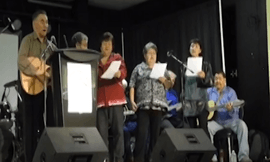promoting partnerships and unity amongst Inuit peoples.
This past July, several Anglican bishops and many other Arctic Anglicans participated in the 2014 Inuit Circumpolar Conference held in Inuvik, NWT (in the Diocese of the Arctic). Inuit from regions around the world including Alaska, the Inuvialuit of the NWT and northern Yukon, Nunavut, Nunavik, Labrador, Greenland and Russia met in Inuvik.

The organization, founded in 1977 and which has grown to include representatives of over 150,000 Inuit, exists to promote unity amongst Inuit groups, to promote Inuit rights and interests at the international level, to encourage government policies that safeguard the Arctic environment and to seek full and active partnerships in the political, economic and social development of circumpolar regions (from www.inuitcircumpolar.com). These quadrennial events are also a celebration of the Inuit’s rich cultural heritage and feature traditional dancing as well as choirs and gospel music from various Arctic regions.
But bishops, prayers and gospel music at an official, government-sponsored event? This may seem strange to non-northerners. Arctic Bishop, David Parsons, explains this interweaving of church and northern culture: “The Anglican Church in the North has not been isolated…In one sense, we don’t have to deal with the type of isolation the Church experiences in the south. Oftentimes, 90 per cent [of our ministry] is not to the people who go to church.”
This relationship that Bishop Parsons describes has not been without strain. Speaking about the legacy of residential schools, he reflects, “Almost all of our people have been survivors, but yet, it’s ‘How do we learn from our mistakes, as a church?’. When we look at society, we’ve done some things very well, others we shouldn’t have done. How can we learn, not be content with what has gone well, and not be defeated by what has gone wrong?”
And while the institutional Church’s reputation has been severely damaged in the hearts and minds of many northerners, Bishop Parsons says, “The part that kept people strong was not the Church, but looking to Jesus…this [the Arctic] has been a strong Bible-centred, Jesus-focused place in the world.”
When it comes to official events or discussions of government policy, the government tends to include the Church, to see its clergy as an important voice for the people. “In those areas we even have a voice, not ‘standing above’…but a lot of the people—clergy, bishops that have been here—have been very down to earth, very much ‘servant leaders’ and in that sense they’ve won the respect of the people,” says Parsons. And, just as significantly, Parsons explains that many of the Arctic clergy are Indigenous.
This ability to work together was on clear display at the Circumpolar Conference. Bishop Darren McCartney describes the “wonderful service to open the conference on Sunday morning” and says that he and Bishop Mark [MacDonald, Anglican Indigenous Bishop] were on hand to provide music for most of the services. This invitation to participate and the strength of this relationship is the fruit of the Arctic approach to mission. Parsons says, “Our ministry is oftentimes to the whole society….We don’t just stick beside those who are Anglican. And there’s a strong sense of perseverance through hard times and good times.”
Your ongoing and generous support of the Council of the North helps to provide for a continuing Anglican presence in the North.
Sharon Dewey Hetke
Council of the North Communications
Interested in keeping up-to-date on news, opinion, events and resources from the Anglican Church of Canada? Sign up for our email alerts .
